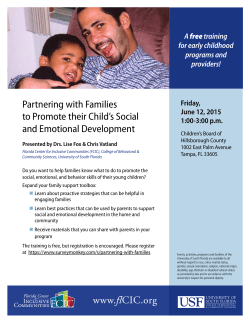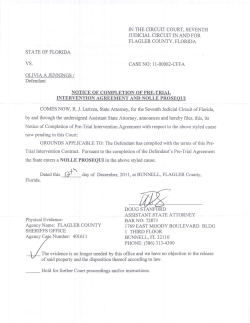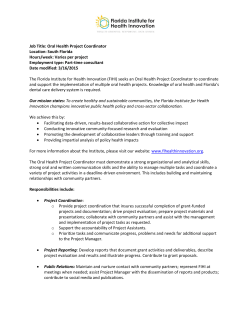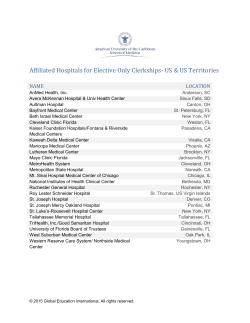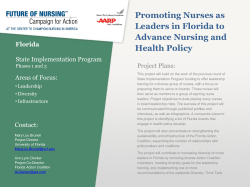
March 30, 2015 The Legislature Approaches Halfway Mark
March 30, 2015 About Us The Legislature Approaches Halfway Mark The 2015 Legislative session is approaching the halfway mark, leaving more questions than answers. The proposed budgets for the house and senate were voted on in their respective full Appropriations Committees last week and will be voted on the chamber floors this Thursday. There were no amendments to the House budget and only a few technical changes to the Senate budget. The senate plan totals $80.4 billion and the house plan totals $76.2 billion. The bulk of the difference lies in the health care budget. The Senate includes funding for low income pool to pay for uncompensated care in hospitals, though it is unclear whether the federal government will grant a new waiver. It also includes funding for Medicaid expansion, though the House has given indication that they will accept the Senate proposal. Any budget negotiations will not occur until these issues have been resolved. Last week was also the last week for House policy subcommittees. Bills that have not cleared their first committee are dead this session, unless leadership takes up the issue. There are several other bills moving through the process that have a better than average chance of passing. The senate corrections package that includes provisions on treating inmates with mental health issues is poised for final passage. The house companion (HB7131) was heard in the first committee. It is nearly identical to the senate proposal, except it removes oversight committees. Florida Partners in Crisis is a 501(c)(3) non-profit education and advocacy organization. We rely on the support of our Justice Institute and Partner Roundtable members and Donors like you to sustain our advocacy and education programs. Please show your support Donate Today Justice Institute The Florida Bar Foundation Bristol Myers Squibb Foundation Disability Rights Florida Holland & Knight, LLP Partner Roundtable Diamond Also moving in both chambers is a bill (HB378/HB99) to expand the use of juvenile civil citations by requiring a law enforcement officer to issue a civil citation or require participation in a similar diversion program in lieu of arrest (including second or subsequent misdemeanors), unless the officer finds that an arrest is warranted for public safety. Eli Lilly & Company Johnson & Johnson Health Care Systems Novartis Pharmaceuticals This will be a short week in the legislature, with regular business concluding on Thursday, April 2, so that members may be with their families over the religious holiday. Mental Health and Substance Abuse Overhaul The House and Senate have moved legislation that proposes major overhauls of service delivery and funding mechanism to DCF-funded substance abuse and mental health treatment. Last week, the Senate Appropriations Committee introduced SB 7068 and the House Children, Families, and Seniors Subcommittee introduced HB7119, which would change the way mental-health and substance-abuse services are administered, coordinate them with primary health care and seek to increase Medicaid funding for them. There are many similarities with both bills, including defining the essential elements of care coordination as a service system for persons needing emergency assistance with behavioral health care through the Baker Act or the Marchman Act; crisis services including mobile response teams and crisis stabilization units; case management; outpatient services; residential services; hospital inpatient care; after-care and post-discharge services; recovery support (housing assistance, employment support, education assistance, independent living skill services, family support and education, and wellness services); and medical services necessary for the integration of behavioral health care with primary care. Priority populations were defined and include high utilizers such as involvement in the criminal justice system. The House bill also includes a few additional components such as requiring a study of the safety-net behavioral health system and includes the use of the Supreme Court Task Force on recommendations to change the Baker and Marchman Acts; and expanding the grant review committee for the Criminal Justice, Mental Health, and Substance Abuse Grant Program and streamlines the local process for applying for grants and allows DCF to require sequential intercept mapping of systems to identify where interventions may be effective. New members included in the grant review committee are: Department of Veterans' Affairs; Florida Sheriffs Association; Florida Police Chiefs Association; Florida Association of Counties; Florida Alcohol and Drug Abuse Association; Florida Council for Community Mental Health, and One administrator of a state-licensed limited mental health assisted living facility. Both bills will be heard this week in committee and will then head to the floor. Platinum Ability Housing of Northeast Florida Circles of Care Florida Alcohol & Drug Abuse Association Florida Council for Community Mental Health Florida Sheriffs Association Jerome Golden Center for Behavioral Health GEO Care Lakeside Behavioral Healthcare LifeStream Behavioral Center Lundbeck Meridian Behavioral Healthcare Otsuka Pfizer South Florida Behavioral Health Network Sunovion The Robert F. and Eleonora W. McCabe Foundation Visit Our Website Senate Proposes to Merge Baker and Marchman Acts The legislature is taking a very in-depth review of the Baker and Marchman Act process as a way to create efficiencies. The Senate has proposed legislation, SB 7070, that will combine the voluntary and involuntary commitment process outlined in both the Baker Act and Marchman Act. The House is taking a more measured approach calling for a study on how to proceed. The goal is to streamline and combine the existing legislation into one process that addresses individuals with mental health, substance use disorder, or co-occurring conditions. Efforts are being made to combine the petition process, the timeframes for action, redefine time in crisis services, and parameters for involuntary commitment. In addition involuntary outpatient treatment is being proposed as an innovative solution to address chronic conditions. Also being advanced is a refinement of the process for the appointment of a guardian and the process for advanced directives for treatment. Both chambers are promoting allowing a family member or interested party to petition for the appointment of a guardian when an individual is deemed by the court to be incompetent to consent to treatment. Both chambers are also addressing notification of patients regarding the advanced directive process and potential expansion to patients with chronic substance use disorders. The Senate Appropriations Committee passed the Proposed Committee Bill 7070 this week with an amendment that adds "The Jennifer Act", establishing a pilot program on coordination and including advance directives for mental health and substance abuse. The bill will be given one committee referral, the Judiciary Committee. The House is taking a slower approach and is calling for a report from the Supreme Court Task Force on Mental Health and Substance Use Disorders to offer recommendations on how to proceed. This recommendation is part of the larger mental health and substance abuse package (HB7119) passed in House Children, Families and Seniors Subcommittee earlier this week. Other Bills of Interest Sen. Nancy Detert (R-Venice) presented SB488, which would reduce the number of years that the Criminal Justice Information Program is required to retain certain minor offender criminal records and establish nonjudicial processes for both criminal history records and the sealing of specified records. The Senate Criminal Justice Committee found the bill unanimously favorable. The "bath salts" bill passed committees in both chambers. The bill adds five substances to the Schedule I list of controlled substances. Sponsored by Rep. Clay Ingram (R-Pensacola) HB897 was found unanimously favorable by the House Justice Appropriations Subcommittee. SB1098, by Sen. Rob Bradley (RPort Orange) unanimously passed the Senate Criminal Justice Committee. The House Justice Appropriations Subcommittee passed Rep. Keith Perry's (R-Gainesville) HB1069 that would allow for a person eligible to participate in a problem solving court to transfer to another jurisdiction if all parties involved consented. The bill unanimously passed through the House Justice Appropriations Subcommittee. A bill (HB5203) sponsored by Rep. Danny Burgess (RZephyrhills) authorizing courts to sentence certain offenders to their respective county jails for a maximum of 24 months provided that the county has a contract with the Department of Corrections passed through the House Appropriations Committee. SB7044, sponsored by Senate Health Policy would create the Florida Health Insurance Affordability Exchange Program (FHIX) that would allow low-income patients obtain and financially take part in their own health care plans. Describing the bill as "a good faith offer" to both the House and Federal government, Sen. Don Gaetz (R-Destin) help support the bill through its unanimous pass through Senate Appropriations. Rep. Kristin Jacobs (D-Coconut Creek) presented HB287 in the House Criminal Justice Subcommittee. The bill initially included Kratom in schedule of controlled substances. During the committee, however, amendments were adopted that would direct the Office of the Attorney General to coordinate with state agencies and addictions professional to collect data on the prevalence of Kratom, and potential harmful impacts. The amended bill unanimously passed, but it still has 2 committee stops in each chamber remaining. The House Children, Families, and Seniors Subcommittee passed HB1193 by Rep. Blaise Ingoglia (R-Spring Hill) creating the Florida Veteran's Care Coordination Program (the Program) within the Florida Alliance of Information and Referral Services to provide a dedicated behavioral healthcare referral services through Florida's 211 Network. An expansion of a pilot program in the Tampa region, the bill requires DCF to designate "care coordination teams" to implement the Program statewide to provide peer support, suicide assessment, and treatment and resource coordination. Both bills will be heard this week in committee. Annual Conference and Justice Institute Mark your calendars! Florida Partners in Crisis' 2015 Annual Conference and Justice Institute will be held May 20-22 in Orlando. We are pleased and excited to once again partner with the Florida Association of Drug Court Professionals, the Florida CIT Coalition and many other partner organizations on this year's education sessions and plenaries. Showcase your talent! There are a few sponsorship opportunities remaining! Please contact Rebecca Roberts for more information rroberts@fadaa.org. Look for a Call for Presentations will be issued shortly. Please join us in May! Florida Partners in Crisis, Inc. | 175 Marlin Drive | Merritt Island | FL | 32952
© Copyright 2025
